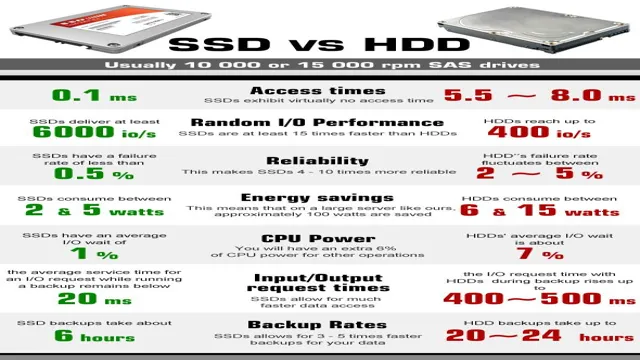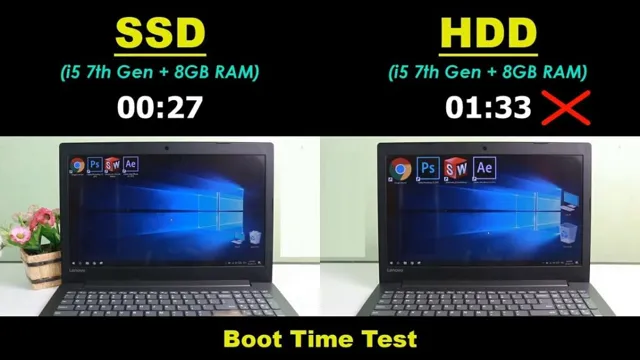When it comes to choosing between SSD and HDD, there are many factors to consider, including cost, storage capacity, and lifespan. However, one of the most crucial factors is speed. SSDs are known for their lightning-fast speed, while HDDs traditionally take longer to access and transfer files.
But just how much faster is an SSD compared to an HDD? And is the increased speed worth the extra cost? In this blog post, we’ll dive deep into the world of storage speed and explore the ins and outs of SSD vs. HDD speed. So buckle up and get ready for a wild ride!
Overview of SSD and HDD Technology
When it comes to storage technology, traditional Hard Disk Drives (HDD) have been the go-to for many years. However, with the advent of Solid State Drives (SSD), storage technology has been revolutionized. While HDDs rely on spinning metal platters and mechanical read/write heads to access data, SSDs use flash memory, making them much faster than their HDD counterparts.
In fact, SSDs are up to 100 times faster than HDDs in terms of read and write speeds. To put this into perspective, imagine a person reading a book with their eyes versus someone scanning the text with a speed-reading app. The person using the speed-reading app would be able to read the book much faster, similar to the way an SSD reads and writes data at lightning-fast speeds compared to HDDs.
With the cost of SSDs decreasing and their performance increasing, it’s not surprising that many computer users are making the switch to SSD.
What is SSD?
SSD SSD, or solid-state drive, is a storage device that stores data using NAND-based flash memory. In contrast, HDD, or hard disk drive, utilizes spinning disks and magnetic heads to read and write data. SSD has become increasingly popular in recent years due to its superior performance and durability compared to traditional HDD technology.
SSDs are faster at accessing data than HDDs, providing quicker boot times and application load times. Additionally, SSDs are more resistant to shock and vibration damage, making them ideal for mobile devices. Although SSD technology is more expensive than HDD technology, the benefits in terms of speed and reliability make it a highly attractive option for tech enthusiasts and professionals alike.

What is HDD?
HDD, SSD, technology HDD or Hard Disk Drive is a traditional data storage device that uses spinning disks to store data on magnetic surfaces. However, with technological advancements, SSD or Solid-State Drive has become a popular storage device in the market. Unlike HDD, SSD uses NAND flash memory chips to store data and does not require any spinning disks.
This feature makes SSD faster, more reliable, and less vulnerable to physical shock and damage than HDD. Although SSDs tend to be more expensive than HDDs, the performance benefits it offers make it a great investment in terms of speed, efficiency, and durability. Ultimately, choosing between HDD and SSD technology depends on individual needs, including budget, performance, and storage capacity.
Speed Comparison of SSD and HDD
If you’re wondering how fast SSDs are compared to HDDs, the answer is simple: they’re much faster. SSDs don’t have any moving parts, which means data can be accessed almost instantly. In contrast, HDDs have spinning disks that need to physically move to access data, which slows down the process.
This is why booting up your computer or launching programs is much quicker with an SSD. In fact, an SSD can be up to 10 times faster than an HDD. Additionally, an SSD’s fast read and write speeds make it ideal for tasks like editing large files, rendering videos, and gaming.
So, if you’re looking to boost your computer’s performance, upgrading to an SSD is definitely worth considering.
Sequential Read and Write Speed
When it comes to comparing the speed of reading and writing data in storage devices, hard disk drives (HDD) and solid-state drives (SSD) are the two main options to consider. HDDs consist of spinning disks that read and write data using an arm with read and write heads, while SSDs have no moving parts and use flash memory to store data. In terms of sequential read and write speed, SSDs have a clear advantage over HDDs.
This is because they can access and retrieve data much faster due to their lack of moving parts. The read and write speed of SSDs can reach up to several gigabytes per second, whereas HDDs typically max out at around 200 megabytes per second. So, if you want to boost the speed of your computer’s storage, upgrading to an SSD is a surefire way to achieve lightning-fast read and write speeds.
Random Read and Write Speed
When it comes to comparing the speed of SSDs and HDDs, one of the most crucial factors is random read and write speed. In simple terms, this refers to how fast a storage device can access and transfer data from anywhere on the disk. SSDs are ten times faster than HDDs when it comes to random read speed.
This means that they can retrieve data from anywhere on the drive with minimal latency, making them excellent for multitasking and heavy usage. In contrast, HDDs can take longer to locate data, resulting in slow loading times and reduced overall system performance. When it comes to random write speed, the difference is less pronounced, but SSDs still have the edge.
The fast write speed of SSDs translates to quicker data transfer and less time required for system backups. Overall, SSDs offer a significant speed advantage over HDDs, making them ideal for high-performance computing tasks.
Access Time and Latency
When it comes to speed, the Solid State Drive (SSD) outperforms the traditional Hard Disk Drive (HDD) by a significant margin. One of the factors that determine the speed of any storage device is the access time or latency, which is the time it takes for the device to locate and retrieve data. HDD’s use a spinning disk and a reading arm to access data, which slows down the process.
On the other hand, SSD’s use flash memory, which is faster and more reliable. In terms of speed comparison, an SSD can perform up to 100 times faster than an HDD, depending on the task. This means that using an SSD-based computer can greatly improve your productivity and experience.
Furthermore, SSD’s have lower power consumption, less noise, and are more durable than HDD’s due to the absence of moving parts. In conclusion, for those who prioritize speed and performance, an SSD is the way to go.
Real-World Performance Comparison
If you’re looking to upgrade your computer’s storage, you may be wondering how fast an SSD is compared to an HDD. Well, let me just say that the difference in speed is like night and day. HDDs are mechanical in nature, which means they have to spin disks to read and write data, resulting in slower read and write times.
On the other hand, SSDs are much faster because they have no moving parts and use flash memory to store data. This means that SSDs can access data almost instantly, allowing for much faster boot times and application load times. In fact, an SSD can be up to 10 times faster than an HDD when it comes to read and write speeds.
So if you’re looking for a significant speed boost, upgrading to an SSD is definitely the way to go.
Boot Time and Shut Down Time
Boot Time and Shut Down Time can be a big factor in your daily use of a computer. Waiting for your computer to start up can be frustrating, especially if you need to use it urgently. On the other hand, a slow shutdown time could be a problem if you need to leave a meeting or finish up work quickly.
That’s why it’s important to have a computer that performs well in both boot time and shut down time areas. Some computers are built with fast-start technology so that they can start up quickly, while others may take a few minutes to boot up. The same goes for shut down time, where a computer with a faster processor and adequate memory can shut down quickly.
Ultimately, you want to strike the perfect balance between a speedy computer and one that still offers the right amount of features and performance.
Application Load Time
In today’s digital age, where speed is everything, application load time is crucial. It can have a significant impact on the user experience, as users will quickly abandon an application if it takes too long to load. That’s why it’s important to test the load times of different applications to determine which ones perform best.
Real-world performance comparisons offer a more accurate assessment of these applications, as they simulate actual usage scenarios. By measuring application load times in different scenarios, we can gain valuable insights into which applications are best suited for certain tasks. Ultimately, we can use this information to select the most optimal applications and help ensure a positive user experience.
Conclusion and Final Verdict
In conclusion, comparing the speed of SSD and HDD is like comparing a roadrunner to a tortoise. SSD is the roadrunner, lightning-fast and capable of delivering impressive speeds while HDD is the tortoise, slow and steady but ultimately outpaced by its nimble competition. With SSD, you can launch applications, transfer files, and boot up your system with lightning-fast speed, leaving the sluggish pace of HDD in the dust.
The bottom line? If you want to upgrade your computer’s speed and performance, SSD is your very own roadrunner that will leave HDD in the rearview mirror. “
FAQs
What is the speed difference between SSD and HDD?
SSDs are significantly faster than HDDs in terms of read and write speeds. An SSD can read data at a speed of up to 550 Mbps, while an HDD can read data at a speed of only 125 Mbps.
How does the speed of SSD and HDD affect the performance of a computer?
The speed of an SSD drastically improves the boot-up time of a computer and reduces the loading time of applications and files. On the other hand, the slower speed of an HDD can cause delays in opening files, applications, and programs.
Can I use an SSD and HDD together in my computer?
Yes, you can use both an SSD and HDD together in a computer. You can install the operating system and frequently used applications on the SSD, and store larger files, such as photos, videos, and documents on the HDD.
Are SSDs more reliable than HDDs?
Yes, SSDs are more reliable than HDDs due to the absence of moving parts. HDDs can be prone to mechanical failure due to physical wear and tear, whereas SSDs are not. Additionally, SSDs are more resistant to physical shock and impact.
